Uganda
Ahead of Uganda's January 14 election, President Yoweri Museveni's government continues to limit the opposition's voices by blocking campaigning, enabling an environment that cannot facilitate a fair and free vote, according to rights groups.
The repression and coronavirus prevention measures have restricted the presidential hopefuls attempts to get their message out with police aiming to physically block them from campaigning.
For instance, opposition candidate and popstar-turned-lawmaker Robert Kyagulanyi Ssentamu, who goes by the name Bobi Wine, has been arrested multiple times.
“The campaign is crazy. It’s like a war and a battlefield,” Wine said before he was detained for a third time in two months on Wednesday.
“Every day, we are met with heavily armed military officers. It’s always teargas and grenades, live bullets and beatings.”
He says he has been targeted with rubber bullets and teargas while campaigning and now wears a bullet-proof vest.
“The campaign is crazy. It’s like a war and a battlefield,” Wine said in an interview conducted before he was detained for a third time in two months on Wednesday.
“Every day, we are met with heavily armed military officers. It’s always teargas and grenades, live bullets and beatings,”
Police clash with police
Meanwhile, shocking images surfaced on social media showing police trying to block presidential candidate Norbert Mao's convoy while he was out on campaign in the northeastern area of Karamoja.
Guns were drawn as Mao's security guards scuffled with police officers.
Uganda Police Force said on Twitter it regrets the incident "between two of our task teams during the DP campaign trail in Abim District", adding that the officers were immediately recalled and replaced pending investigation.
But the incident is not unique. The appointed officer of presidential hopeful John Katumba, who was trying to stop his arrest also scrapped with police.
Otsieno Namwaya, a researcher at Human Rights Watch told Africanews that while he could not fully comment on the videos as they had not been verified he said the thought the clashes were "partly because the authorities can no longer guarantee security to presidential candidates".
Additionally, he said, "presidential candidates are including partly their own security alongside the security provided by the state."
Arrests
In December, the government banned election rallies as it said it may spread COVID-19. But some opposition candidates say it prevents a fair vote as government allies control many media outlets.
More than 100 of Wine's team were arrested while campaigning on December 31 and later granted bail.
In November, more than 50 people died in protests following another Wine arrest.
Wine, 38, is one of 10 candidates seeking to unseat the incumbent 76-year-old Museveni, who is seeking to extend his 34-year rule.
But Namwaya noted other worrisome trends facing the presidential election.
He claims presidential candidates and other opposition politicians are being prevented from holding meetings.
He also said the rights group believes hotels are acting at the behest of the authorities by refusing to accommodate candidates at "very critical hours".
And even more worrisome, he said HRW has reported authorities interfering with the communication facilities of the opposition, including phones and Internet communications.
Namwaya also mentioned police attacking and even shooting journalists who cover the opposition campaign rallies.
"There are serious security threats to the opposition candidates, to their supporters and to the journalists who try to cover the events," he said.
Free and fair election?
While opposition intimidation has marked previous presidential campaigns, analysts say the crackdowns by security forces have been more brutal in the election.
Kizza Besigye, who ran in four previous elections was harassed in similar ways to Wine. But Namwaya said this year has been worse as Wine is not even allowed to access campaign venues or speak to his supporters.
"A free and fair election can only be guaranteed when certain standards are met," Namwaya said.
"The authorities are controlling tightly the other candidates and trying to prevent them from accessing their supporters or blocking information. In our view, that's an environment that does not facilitate a free and fair election.
"And there's a likelihood or there's a potential for the Ugandan elections, the credibility of the Ugandan elections to be seriously affected," he said.



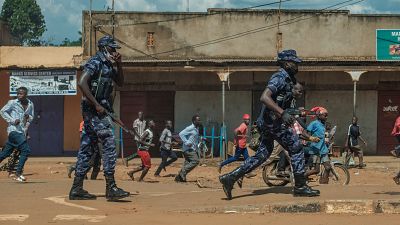

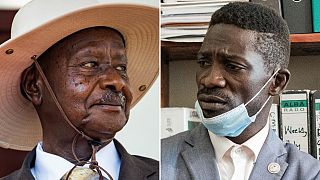
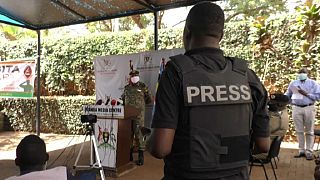
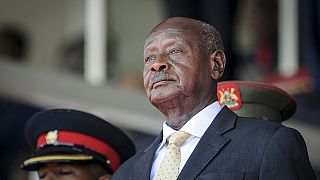
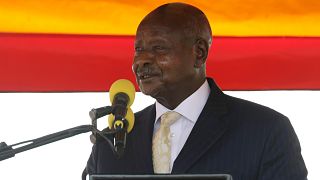



Go to video
Southern Syria: renewed violence between Druze and Bedouin clans
00:54
Haitians mark annual Voodoo-Christian pilgrimage amid gang violence
01:19
Record number: nearly 1.3 million Haitians now internally displaced
01:20
DRC: M23 rebels executed at least 21 civilians in Goma, Human Rights Watch says
01:38
OAS urged to do more to help Haiti fight gang violence
01:14
ICC makes progress in investigating alleged war crimes in Libya